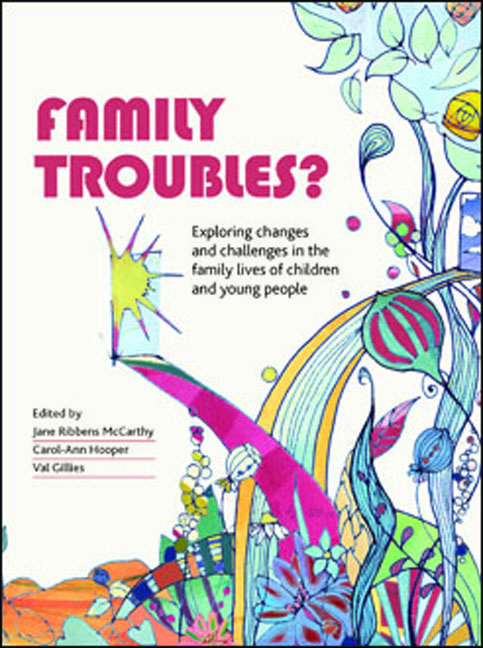Book contents
- Frontmatter
- Contents
- Notes on contributors
- Foreword
- Preface
- 1 Troubling normalities and normal family troubles: diversities, experiences and tensions
- Part One Approaching family troubles ? Contexts and methodologies :Introduction to Part One
- Part Two Whose trouble ? Conteste d definitions and practice: Introduction to Part Two
- Part Three The Normal, The Troubling And The Harmful?: Introduction to Part Three
- Part Four Troubles and transitions across space and culture: Introduction to Part Four
- Part Five Working With Families: Introduction to Part Five
- Index
Part One - Approaching family troubles ? Contexts and methodologies :Introduction to Part One
Published online by Cambridge University Press: 07 September 2022
- Frontmatter
- Contents
- Notes on contributors
- Foreword
- Preface
- 1 Troubling normalities and normal family troubles: diversities, experiences and tensions
- Part One Approaching family troubles ? Contexts and methodologies :Introduction to Part One
- Part Two Whose trouble ? Conteste d definitions and practice: Introduction to Part Two
- Part Three The Normal, The Troubling And The Harmful?: Introduction to Part Three
- Part Four Troubles and transitions across space and culture: Introduction to Part Four
- Part Five Working With Families: Introduction to Part Five
- Index
Summary
In this opening section of the book, we set the scene for some fundamental issues for understanding and researching family troubles in the lives of children and young people, and raise some core questions about how we can consider family troubles in the changeable and changing contexts of varying cultures and historical periods. While each of the four introductory chapters takes a particular focus, the issues they raise are also touched upon through other chapters in this section. Thus, in terms of the methodological issues raised by Michael Rutter and Ara Francis concerning the basis of knowledge around family troubles, questions of context are still as crucial (and troubling) as they are in the more theoretical and substantive chapters by Jill Korbin and Janet Fink. And, as Korbin and Fink consider cultural and historical contexts, respectively, the concerns of their chapters, in turn, suggest significant methodological considerations. And across all of these four chapters, insights are provided into various substantive topics concerning family troubles as these are used to illustrate the arguments made. Korbin particularly focuses on child maltreatment across cultural contexts; Fink considers historically variable concerns regarding ‘lost’ childhoods and the ‘losses’ experienced by children and their parents; Rutter's examples of science in action include physical abuse and maltreatment of children, genetic and environmental mediation of mental health outcomes, resilience, and residential care; while Francis particularly considers qualitative research on child abuse, mental health issues, low-income unmarried mothers and middle-class parents whose children are considered to have ‘significant problems’.
In the first chapter, Jill Korbin sets out a concise and thoughtful overview of global cultural issues in relation to family troubles – highlighting some major points for consideration. In discussing evidence that culture has been identified as one of 10 major principles affecting human development, Korbin argues that questions of culture have been seriously neglected in traditional child development research, often based on samples from very particular cultural contexts. This, then, points to methodological and ethical issues of complexities and contradictions in researching the everyday settings and practices of child development across cultures as well as between different groups within particular cultures. In Korbin's discussion, culture is crucial in helping to shape the meanings of children's everyday lives and thus in framing what comes to constitute ‘trouble’, which has to be understood by reference to community expectations of what is considered desirable.
- Type
- Chapter
- Information
- Family Troubles?Exploring Changes and Challenges in the Family Lives of Children and Young People, pp. 23 - 26Publisher: Bristol University PressPrint publication year: 2013



